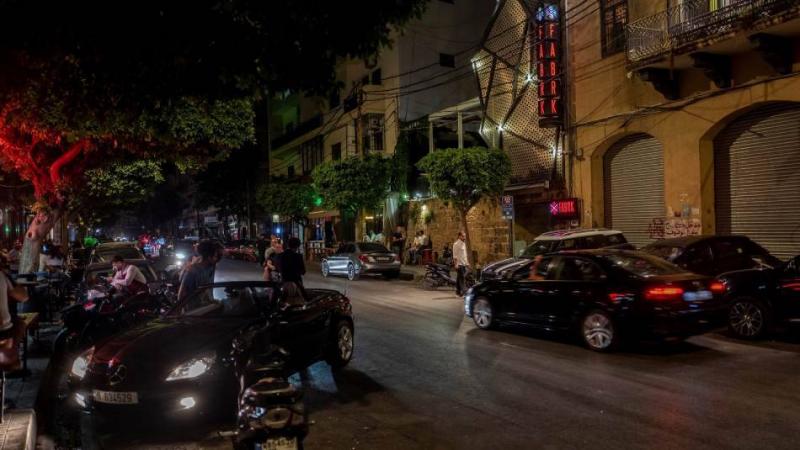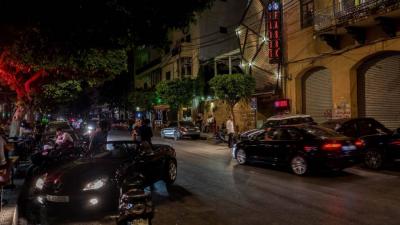Perhaps the streets of Gemmayzeh and Mar Mikhael are the most famous and attractive in the city, both for residents and passersby. Between the miracle of reconstruction, which was the foundational block of this fame and influx, and the general misfortune lurking over the residents of Gemmayzeh and Mar Mikhael, along with despair and helplessness, the shock of the explosion and collapse that were painted and patched with tourism and support dollars, there exists a wide chasm dividing the people into two halves. This situation has put the residents living here in confrontation with the service sector and the interests of the owners, and a mutual resentment has accumulated between them, reaching the point of protests.
About a week ago, residents of Gemmayzeh and Mar Mikhael held a protest under the slogan "Do not disturb our peace," expressing their deep discontent and firm rejection of the chaos and noise resulting from the proliferation of bars, restaurants, and nightlife venues. They threatened officials in the concerned ministries and the business owners of cafes, nightclubs, and bars with escalating actions that could even lead to violence, after nearly ten years of demanding, negotiating, and bargaining for their peace and safety. On the other hand, indifference is looming in the future from these establishments, their owners, and employees, considering that the tension and media hype generated by residents is "unjust" to these establishments, which constitute the nerve center of the tourist attraction for the afflicted area, despite the fact that the majority of these businesses have recently reopened or were established after the port explosion.
### Details of the Debate
In a conversation with "The Cities," a woman who has lived on the main road of Gemmayzeh for about twenty years points out that the roots of the problem, which flared up in early 2010 after the opening of a large number of nightlife venues to attract more foreign tourists to this area—historically a residential area for the elderly—are not just a detail in light of what the residents are experiencing today. These bars, crowded throughout the week, with patrons not leaving until the early hours of the morning, accompanied by loud music, alcohol, dancing, and their boisterous voices filling the space, have caused relentless disruptions to residents' peace. "Patrons revel and party all night to a cacophony of music that exceeds the 55 decibel threshold enforced by the concerned ministries, forcing tired residents to stay awake, longing for deep and quiet sleep," she adds. This, coupled with choking crowds and heavy traffic, has rendered the streets unlivable.
The woman continues: "We are not asking for these establishments to be shut down; we demand the enforcement of laws and regulations that could alleviate the hardship we endure. We urge the security authorities to control the violators among the patrons who cause disturbances or trespass on our buildings by sitting or standing in their entrances, consuming drinks, and sometimes leaving their sexual waste there."
George M., a retired man in his sixties living on Mar Mikhael Street, confirms what the woman said: "Our street is no longer safe at all; we hear the revelers under our windows until morning, who later leave their trash for someone else to collect. Moreover, we cannot walk safely on the sidewalks we pay annual rent for to the municipality, as most of the restaurants and bars have decided to occupy them claiming they rented them from the municipality as well. I am of an age where I cannot walk safely in the street overwhelmed by speeding cars. The smell of the burnt silos has become secondary to the stench of the waste piling up at the corners of the streets. The major crisis is that we have not yet recovered from the shock of the explosion, and we are still trying to cope with what happened and repair our damaged properties and ourselves, while others come astonished by the beauty and speed of reconstruction, lounging in fancy cafes, restaurants, and bars that we, the locals, cannot sit in, behaving freely without regard for their violation of our peace and homes."
### Shop Owners Respond
During the protest, the committee of residents of Gemmayzeh and Mar Mikhael condemned the negligence and indifference of the officials in the concerned ministries towards their urgent demands, and the business owners who, according to the committee, use flimsy excuses to justify their violations. Despite laws dictating a certain distance between bars, and attempts by officials in the Ministry of Tourism and Interior to control the chaos and noise by enforcing the closure of these bars by midnight on weekdays and 12:30 AM on weekends, and forcing them to lower music levels by eleven o'clock, the residents remain dissatisfied.
For their part, these shop owners assert that they are compliant with the law. In discussions with "The Cities," several stated that some details being promoted are certainly exaggerated. Their bars are in a state of steady decline, as patrons are concentrated in a limited number, while most establishments barely attract a few customers all week. They collectively acknowledge the residents' demands but ask them to be patient and consider that these businesses support dozens of families of workers, waiters, foreign staff, and others, and that it is not feasible to close them based solely on the wishes of a few disgruntled individuals. They insisted that the ongoing economic crisis, which has heavily burdened them without recovering from the losses of the explosion, is a fundamental factor in the collapse of their businesses in favor of high-end establishments or popular shops that offer food and alcohol at cheaper prices. Furthermore, they refuted accusations of usurping the sidewalks, stating, "We pay rent for them to the Beirut Municipality."
### The Municipality and the Ministry of Tourism
"The Cities" followed up with a source in the Beirut Municipality regarding this debate, which has been exchanging blame and responsibilities among disputing parties. It learned that this issue, open for years, still remains unresolved in the drawers of the municipality and relevant ministries. This is because these two streets have become a focal point for attracting tourism, playing an effective role in drawing in tourists, expatriates, and residents from affluent classes. The state is eager for more dollars in any form, even at the expense of its citizens. Meanwhile, business owners are trying to reclaim their losses caused by the explosion and the economic collapse. Citizens, in contrast, are frustrated by the chaos and the ostentatious displays of luxury while they strive to secure their livelihoods in the fierce and relentless crises that pursue them.
If the solution lies in activating issued decisions and laws, such as implementing Annex No. 10 of Minister of Environment Decision No. 52/1 dated July 29, 1996, regarding auditory and environmental pollution, and Decision No. 162 issued by the Ministers of Interior and Tourism on February 25, 2009, to define the operating conditions of restaurants, bars, and nightclubs within residential areas, as residents stated in a series of their demands, which also included closing unlicensed tourist establishments that violate Articles 4 and 5 of Decree No. 15598/2 dated October 21, 1970 regarding the type of licenses in residential areas and the distance between these establishments as well as freeing the sidewalks from permits to allow all residents to walk on them.
"The Cities" attempted to contact several officials in the Ministry of Tourism, including the minister, to inquire about the ministry's role in this dilemma and whether they are devising plans or solutions for this crisis in the tourist streets. However, no clear response was received from either the minister or his advisor, who was abroad. The inquiry also extended to officials in the Ministry of Interior and Municipalities, who refrained from making any statements on this matter.
The majority of the residents' demands are fundamentally justified. They are merely seeking peace in their homes, and they truly need official ears to listen to their requests, express opinions, and propose solutions. However, it is important for residents to understand that in targeting an already depleted sector, they may unintentionally clash with the workers who are under the poverty line. It is crucial today to seek solutions that satisfy all parties. The municipality and relevant authorities must shoulder their responsibilities towards citizens, who were affected by the state's negligence in the capital explosion and the destruction of their homes, businesses, and livelihoods. Today, they stand helplessly before their demands for the most basic rights—peace and safety.




